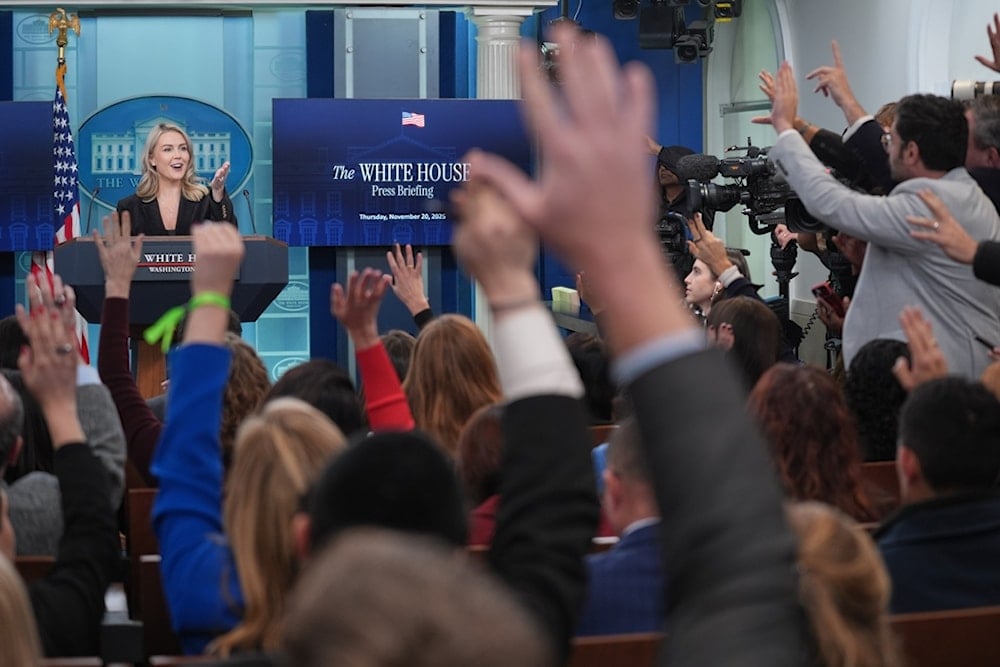US confirms Ukraine peace plan effort, opts out of G20 discussions
The US unveiled a Trump-approved Ukraine peace plan requiring major concessions from Kiev, while also confirming its boycott of the G20 summit over Trump’s debunked claims about white persecution in South Africa.
-

Reporters raise their hands to ask questions of White House press secretary Karoline Leavitt during a press briefing at the White House, Thursday, Nov. 20, 2025, in Washington (AP Photo/Evan Vucci)
White House spokesperson Karoline Leavitt told Al Mayadeen on Thursday that the United States has prepared a detailed plan acceptable to both Russia and Ukraine, aimed at achieving a lasting peace in Ukraine.
A senior US official said US special envoy Steve Witkoff has been working quietly on the plan for the past month, gathering input from Ukrainians and Russians on the conditions both sides may accept to end the war. The official added that both sides will have to make concessions, "not Ukraine alone," noting that President Donald Trump has reviewed the plan and approved it.
The proposal, which reportedly takes the form of a 28-point framework, has already raised concern among US allies and Ukrainian officials. According to reports published this week by Axios, NBC News, Politico, and Reuters, the draft envisions significant concessions by Kiev, including granting Russia full control over the Donbas, Luhansk, and Donetsk regions, recognizing Moscow’s authority over Crimea and parts of eastern Ukraine, and potentially reducing Ukraine’s long-range weapons capabilities and the size of its armed forces. In return, Washington would offer security guarantees intended to prevent further Russian advances and provide what US officials describe as the basis for a “durable peace.”
While the White House argues that Ukraine risks losing more territory if the conflict continues, Ukrainian officials say they were not involved in shaping the details of the plan and oppose several of its provisions. Reports also indicate that Qatar and Turkey have been supporting the mediation effort and that Witkoff has held extensive talks with both Russian and Ukrainian representatives, including Russian envoy Kirill Dmitriev and Ukrainian National Security Advisor Rustem Umerov.
Despite these diplomatic contacts, Moscow has denied receiving any official proposals from Washington. Meanwhile, US allies in Europe have demanded that Washington ensure Kiev and EU partners are fully involved in any peace initiative, warning that the plan remains unclear and that no concessions from Russia have been articulated.
Washington Skips G20
Leavitt also confirmed that the United States will not take part in the upcoming G20 summit, noting that the US chargé d'affaires in Pretoria will attend the handover ceremony only as a procedural formality. Her remarks come amid continued fallout from Trump’s decision earlier this month to boycott the Johannesburg gathering entirely.
On November 8, Trump announced that neither he nor any US officials would attend the summit, repeating widely debunked claims that white South Africans are being 'murdered and oppressed.' He insisted that the United States would not participate 'as long as these human rights abuses continue,' echoing conspiratorial narratives that South African courts and rights groups have repeatedly dismissed as fabricated. The South African government sharply rejected Trump’s accusations, calling them unsupported by evidence and politically motivated.
These new comments by Leavitt followed a statement by South African President Cyril Ramaphosa, who said his government has been in contact with Washington over the possibility of some form of US participation despite Trump’s boycott order. Speaking at a joint press conference with European Commission President Ursula von der Leyen and European Council President António Costa on Thursday, Ramaphosa said: "We have received notice from the United States, a notice which we are still in discussions with them over about a change of mind about participating in one shape, form or other in the Summit."
Ramaphosa has been outspoken in his criticism of Trump’s decision. On November 13, he rebuked the boycott as self-defeating and accused the US president of reviving long-discredited racialized conspiracy theories to justify disengagement. He noted that "boycott politics doesn’t work" and warned that Washington was only diminishing its own influence by refusing to attend a summit hosted on African soil for the first time.
He added on Thursday that Pretoria will have to determine what is possible concerning how, if at all, US officials may take part in the meeting, stressing that the summit’s agenda will proceed regardless of Washington’s stance.
Read more: UN urges probe into Palestinians forced from Gaza to South Africa

 4 Min Read
4 Min Read








